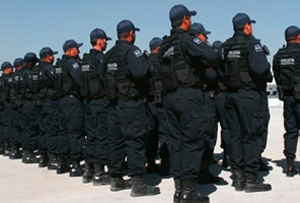Keep the Military Out of Latin America’s War on Drugs

Through employing both air and land tactics, Latin America’s armed forces have driven the region’s war on drugs within their respective countries. On October 15, Latin News reported on the enthusiasm displayed by the Mexican military upon capturing Alfredo ‘El Comandante’ Alemán Narváez, the leader of the San Luis Potosí branch of Los Zetas drug cartel. Then, on November 4, similar feelings were expressed after the Colombian armed forces captured and killed Alfonso Cano, commander of the Revolutionary Armed Forces of Colombia (FARC). This achievement is considered “the hardest hit that the… FARC has received in its 47-year history full of violence, death, narco-trafficking, and kidnapping” [author’s translation]. Even though militaries have often proven to be better qualified to combat the increasingly developed drug cartels, it would be a mistake to regard them as an appropriate replacement for local police forces.
Recent successful military-led operations as those witnessed in Mexico and Colombia could convince Latin American political leaders that the best way to eradicate the violence instigated by drug trafficking organizations is for their countries to call upon their armed forces to take on a permanent and clearly defined strategic role in the drug war. Though employing such methods has proven successful in disrupting specific cartels’ operations on given occasions, it runs the risk of giving the military too influential a position in the daily lives of average citizens, which could have a number of important implications.
First, an expanded military presence could inspire governments to depend on state forces to carry out the role of local law enforcement bodies. Such heightened military involvement could readily evoke once again the revival of the ‘mano dura’ (iron first) strategies for tackling domestic security matters. Such an overreach brought about by the blurred distinction between the proper functions of the armed forces and police is not new. A number of Latin American nations historically have been unable to quell internal violence and maintain domestic stability without the use of their national security forces, and therefore are reluctant to concede that maintaining civilian supremacy over domestic security is an automatic or easy practice. A greater military presence could conjure memories of the dictatorships that savaged much of Latin America in the 1970s and 1980s and could lead to human rights violations similar to those committed during that brutal era when the military was intent not on recycling the political process, but destroying it. Though the police also have been accused of human rights abuses, the military is less likely to be trained in interacting with civilians as is the case with police forces, and such close contact with the military could inadvertently lead to more human rights violations and extra-legal practices that would be committed in the name of civil order.
Additionally, if Latin American governments come to rely on the armed forces to solve societies’ problems, they may no longer see the need to invest sufficiently in local law enforcement or call for the necessary training of local police forces. In countries like Mexico, where police officers routinely take bribes from the cartels to supplement their normally low salaries, reduced funding could only lead to increased corruption within the police forces, posing a greater obstacle to eradicating crime.
Although military involvement in a country’s internal affairs has long been a habitual aspect of Latin American nations’ local law enforcement strategies, improving the effectiveness of local police agencies should remain a priority for Latin American authorities who are attempting to destroy drug trafficking organizations. Dependence on the military has hindered the development of an effective and professional police force needed for long-term security at home. Stronger, better-trained local police forces would be a fundamental and essential start for lessening the need for military involvement, which would allow the state’s armed forces to be reserved exclusively for external threats. By increasing investment in local police forces in the form of higher salaries and better training, these nations have a more certain chance of equipping police officers with capabilities to enforce the law that does not require turning to their military.
To read this analysis in Spanish, click here.

